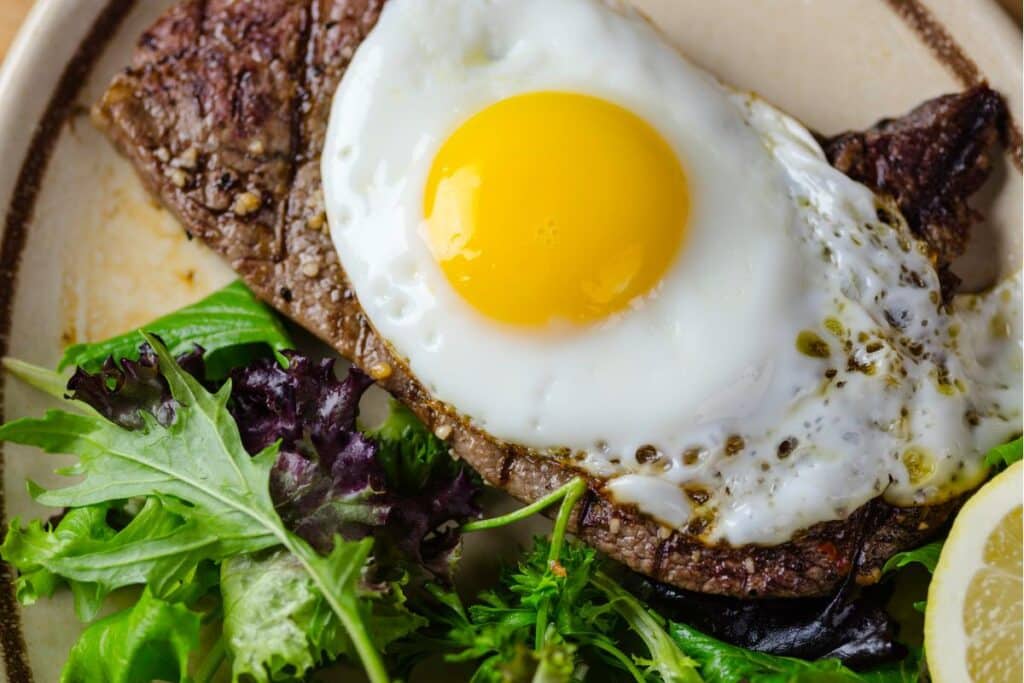The quest for increased testosterone levels has many men turning to various dietary strategies, with the steak and eggs diet often touted as a hormonal elixir. Testosterone is critical not just for libido and muscle growth, but also for overall health, influencing everything from mood to cardiovascular health. In this article, we will explore the connection between consuming steak and eggs and testosterone levels, separating fact from fiction based on scientific evidence.
Understanding Testosterone and Its Importance:
Testosterone is a key hormone in the body, predominantly in men, affecting various physiological processes. It is vital for:
- Muscle mass and bones
- Facial and pubic hair
- Body’s development of deeper voices
- Sex drive
- Mood and quality of life
- Verbal memory and thinking ability
The Role of Diet in Testosterone Production:
The body requires certain nutrients to produce testosterone, including:
- Proteins: Essential for maintaining muscle mass and aiding in hormone production.
- Fats: Cholesterol, found in foods like eggs, is a building block of testosterone.
- Vitamins and Minerals: Vitamin D, zinc, and magnesium have been linked to testosterone production.
The Steak and Eggs Connection:
Steak and eggs are packed with protein and saturated fats, which are necessary for testosterone production. Here’s how they might contribute:
- Protein Power: Steak is a high-quality protein source, which is crucial for maintaining muscle mass and supporting hormonal balance.
- Fat Factors: Both steak and eggs contain saturated fats, which are precursors for cholesterol, from which testosterone is synthesized.
- Cholesterol Content: Eggs, especially the yolks, are rich in cholesterol. While excess cholesterol can be harmful, the right amount is needed for hormone production.
- Nutrient Nuggets: Steak and eggs are also rich in zinc and vitamin D, nutrients important for maintaining optimal testosterone levels.
Examining the Evidence:
While steak and eggs provide many of the building blocks for testosterone, the relationship between diet and hormone levels is complex. Studies suggest that balanced diets with adequate protein and fats support testosterone production, but overconsumption can lead to other health issues.
Balancing the Plate for Hormonal Health:
- Portion Control: Excess calorie intake can lead to weight gain and potentially lower testosterone levels. Moderation is key.
- Diverse Diet: A diet that includes a variety of nutrients is best for overall health and hormone balance.
- Lifestyle Factors: Exercise, sleep, and stress management are also critical for hormonal health.
Potential Pitfalls:
Relying solely on steak and eggs for a testosterone boost can have drawbacks:
- Heart Health: High intake of saturated fats and cholesterol can increase the risk of heart disease.
- Nutritional Imbalance: A narrow focus on steak and eggs might lead to a deficiency in other nutrients not found in these foods.
Conclusion:
While the classic combo of steak and eggs can provide nutrients conducive to supporting testosterone production, it is not a standalone solution. A balanced approach to diet, along with a healthy lifestyle, is the most reliable method to maintain optimal testosterone levels and overall health.
It’s also important to consult with healthcare professionals before making significant dietary changes, particularly for individuals with specific health conditions or dietary restrictions. In the end, the best diet for boosting testosterone is one that is varied, nutrient-rich, and tailored to your individual health needs.




